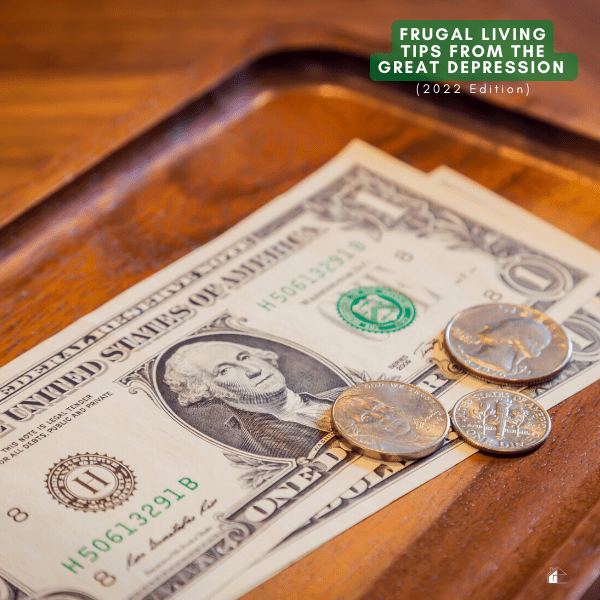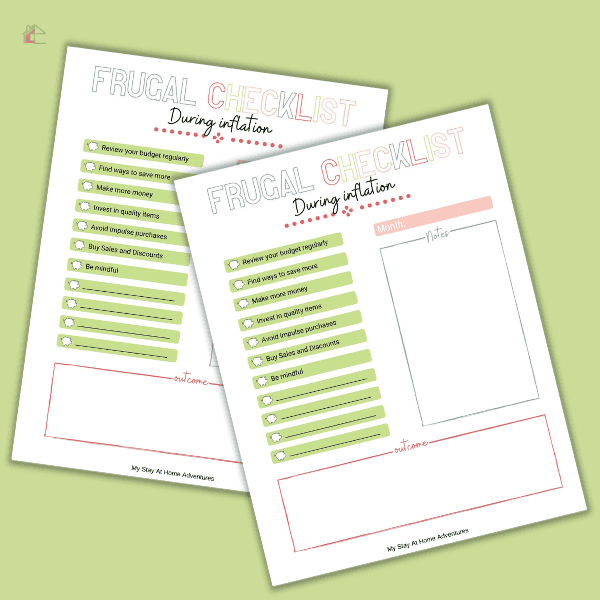13 Frugal Living Tips From the Great Depression
This post may contain affiliate links which might earn us money. Please read my Disclosure and Privacy policies hereAre you interested in learning how to live a frugal life? If so, you're in luck! I'm going to share 13 frugal living tips from the Great Depression. These tips are still applicable today and can help you save money.

How many Americans are frugal today?
In a survey conducted by Personal Capital, 90% of Americans say they have frugal habits. However, while 56.4 percent of respondents said it's simple to stick to a budget, 35.9 percent reported struggling with the urge to spend all of the time or frequently.
Does the Future Look More Frugal?
A frugal future may be on the horizon for many people. Much younger generations spend on things that matter to them and less on entertainment, eating out, and traveling.
Being frugal is often associated with cheap, but the two are not the same. Frugality is about being mindful of your spending to achieve long-term financial stability, while being cheap is simply about spending as little money as possible.
According to a recent survey, the top three reasons why respondents maintained frugal spending habits were because they're saving for future investments (56.3%), they have a lack of savings (51.9%), and they need a rainy day fund (42.6%).
While there are many different motivations for being frugal, these three reasons underscore the importance of financial planning and self-control.
By being frugal with their spending, respondents are more likely to reach their financial goals, whether saving for a down payment on a house or building up an emergency fund.
It can be too easy to overspend and rack up debt in today's largely consumer-driven society.
But by keeping a closer eye on their spending and making frugality a priority, respondents are taking control of their finances and setting themselves up for a bright future.
But in case you are new to what frugality is or need a better understanding of the term, keep reading below.
So, what exactly is frugality?
Frugality is the act or state of being thrifty; careful management of material resources, especially money.
Frugality has both a financial and emotional component. When it comes to your finances, frugality is all about spending less money than you earn and investing the difference wisely.
Emotionally, frugality is about contentment – being happy with what you have and not striving for more.
What is frugality in philosophy?
The frugality definition in philosophy is the virtue of avoiding wastefulness and extravagance. A frugal person uses resources sparingly, carefully, and efficiently.
The frugal person is resourceful and knows how to make the best use of what they have. They are not wasteful or extravagant, nor are they stingy. The frugal person strikes a balance between using what they need and not wasting anything.
Frugality is about living simply and efficiently, without needless extravagance or wastefulness. It is a philosophy of life that anyone can adopt, regardless of income or financial situation.
Those who live frugally are often some of the happiest and most content people because they have learned to appreciate the simple things in life and do not take anything for granted.
What is a frugal person?
A frugal person carefully considers both the cost and the quality of an item before making a purchase.
They understand that there is often a trade-off between price and quality, and they are willing to sacrifice some immediate gratification to save money in the long run. In addition, frugal people value their time and do not want to waste it on activities that do not bring them joy.
This means that they are often very selective about spending their money, choosing only to purchase items they truly need or will add value to their lives.
By being frugal, people can save money, live more responsibly, and use their time in more productive and fulfilling ways.
13 Frugal Living Tips From the Great Depression
The Great Depression was a time of immense hardship, but it also taught people the value of thrift and self-sufficiency.
One of the biggest lessons of the Great Depression was not to waste anything. Every scrap of food had to be used, every piece of clothing mended, and every bit of furniture repurposed.
This frugality carried over into other areas of life as well. People became more resourceful, finding ways to make do with what they had. As a result, the concept of waste became taboo.
Fast-forward to the present day, and we have forgotten this lesson. Waste is everywhere, from the mountains of packaging material in landfills to discarded clothes after only a few wears.
We have become a society of consumers, buying things that we don't need and discarding them when they are no longer useful.
But if you want to live frugally and save money, continue reading.
These 13 frugal living tips from the great depression still have value today, and being more mindful about using resources will benefit us today.
Buy Preowned Items
During the Great Depression, people couldn't afford to buy new things. As a result, they became very good at repairing and repurposing old items.
Nowadays, we have access to second-hand stores where we can find gently used items for a fraction of the cost of buying new ones.
You can still apply this frugal tip from the Great Depression today to save money.
The bonus to buying pre-owned items is that we are eco-friendly and keep perfectly good things from the landfill.
Wear It Again
Most people don't think twice about throwing their clothes in the laundry hamper as soon as they take them off. But how often are we washing clothes that are dirty?
Washing clothes wear them out much faster and consume electricity, water, and detergent.
An easy way to cut back on laundry is to wear your clothes more than once before washing them.
Of course, this doesn't apply to things like underwear and socks, but you'd be surprised how many times you can wear a shirt or pants before they need to be washed.
So next time you're about to throw your clothes in the hamper, ask yourself if they're filthy. You might be able to save yourself some time – and money – by wearing them again.
Grow a Garden
Many, many people living during the great depression had a garden. Growing a garden can save you money on produce. The most cost-effective way to grow a garden is from seed.
Having a garden is also a way to earn extra money if you have excess produce.
It is also possible to grow a garden that will feed you year-round if you can produce to use in the winter.
Cooking From Scratch
One of the best frugal living tips from the Great Depression is to cook from scratch.
This may seem like a lot of work, but it doesn't have to be. You can make many simple recipes with just a few ingredients.
Cooking from scratch will save you money because you will avoid all the processed foods that are so expensive.
It will also help you eat healthier because you will know exactly what is going into your food.
So next time you're considering ordering takeout, try cooking a simple meal from scratch instead. You'll be surprised at how easy it is – and how much money you'll save!

Get a Library Card
Indeed, during the great depression, people engaged in many shared activities to save money and help out others in their community who were struggling.
For example, many families would trade goods and services instead of buying everything new. Additionally, people would often host large gatherings at their homes to entertain without spending any money.
However, one activity that did not necessarily take place more during the depression era was visiting the library. While libraries were getting started during this time period, they were not as prevalent as they are today.
Therefore, people were less likely to consider them as entertainment and education resources. Nevertheless, libraries can be an excellent asset for saving money, especially for bookworms who would otherwise have to purchase all of the books they read.
In addition to books, libraries also offer cookbooks, DVDs, board games, and music CDs – all of which can be borrowed for free.
So next time you're looking for a cheap way to entertain yourself or your family, remember to visit your local library!
Reduce Spending
During the Great Depression, overspending money on unnecessary items was not an option for most people.
While we may not be in a depression now, we can still learn from this frugal tip and reduce our spending.
One way to do this is to limit your impulse purchases. For example, when you see something you want, make yourself wait 24 hours before buying it.
This will give you time to think about whether you really need the item and whether it is worth the money.
Another way to reduce your spending is to create a budget and stick to it. Determine how much money you have coming in each month and allocate funds for different expenses.
Once you have spent all of the money in your budget, you will have to wait until the next month to make additional purchases.
Living frugally does not mean that you have to deprive yourself of all the things you enjoy.
It simply means being mindful of your spending and making smart choices with your money.
Do It Yourself
We are so used to paying someone else to do things for us in today's society.
Whether it's getting our nails done, hiring a lawn care service, or taking our car to the mechanic, we are happy to pay someone else to do it.
However, this was not the case during the Great Depression. People were much more likely to do things themselves to save money.
For example, women would give each other at-home manicures instead of going to the salon. Men would fix their cars when they broke down, and families would grow their fruits and vegetables.
Nowadays, we are starting to see a resurgence in the DIY movement.
More and more people are taking the time to learn how to do things themselves as a way to save money.
DIY is not all about making cute home decor items! Doing things ourselves is a way to imitate the ways of the great depression. People used to fix things themselves, make things and create things! They learned how to do things they didn't know how to do.
One thing we have that people in the depression didn't have is YOUTUBE! We can watch a video to teach us almost anything. For example, it is easy to learn how to fix a dishwasher, change the oil, etc., with YouTube.
Maintain Your Things
One frugal living tip from the Great Depression that is still relevant today is to maintain your belongings.
During the Depression, people could not afford to replace their belongings as often as we do now.
As a result, they had to take care of their things and make them last as long as possible.
Nowadays, we live in a society of planned obsolescence.
This means that products are designed to break after a certain amount of time so that you have to buy a new one.
However, if we take the time to maintain our belongings, we can make them last much longer.
For example, instead of throwing out a piece of clothing with a small stain on it, we can learn how to remove it.
Maintaining our belongings is not only frugal but is also eco-friendly.
Even I am guilty sometimes of just wanting to buy something new instead of fixing the old item. We shouldn't just throw out something that isn't working quite right. You can fix most things cheaper than buying new ones.
It is essential to research the cost of repair because occasionally, it will be more expensive to fix an old item, and if that is the case, it may be more cost-effective to buy new.
Make your own cleaning products
Another great tip is to make your own cleaning products. Not only will this save you money, but it is also better for the environment.
There are many recipes online for DIY cleaning products that you can make with ingredients you probably already have in your home.
For example, vinegar is a great natural cleaner that you can use to clean surfaces, floors, and toilets.
Baking soda is another ingredient that can be used for cleaning. It can be used as a natural scouring agent or to absorb odors.
There are endless possibilities when it comes to making your own cleaning products. So get creative and see what works best for you!
Learn Basic Sewing Skills
The vast majority of women knew how to sew during the great depression. They made their own clothing, bedding, and even pillows.
I know that not every person reading this wants to sew clothes for their families, and that is okay! However, if we learn basic sewing skills, we can make our clothes last longer by being able to fix easy issues.
If you need to learn some basic sewing skills, check out the great courses on Craftsy! They have tutorials for beginners, and it is a really cheap way to learn!
Make Homemade Gifts
It is relatively easy to make quality homemade gifts. These work great when you need a gift for a co-worker or someone's birthday.
If you are not crafty with gifts, you can give delicious baked goods or treats. Don't forget that giving a handmade card will save you several dollars.

Learn the Difference Between Wants and Needs
This frugal living tip is probably the most important one on this list.
It is so easy to want things that we do not need.
Before you make a purchase, ask yourself if it is something that you really need or something that you just want.
You may be surprised at how often you can talk yourself out of buying something you do not need.
If you are still unsure, sleep on it! If you still want the item the next day, then it is probably something that you need.
Of course, there are exceptions to this rule, but in general, if you can wait to buy something, you probably don't need it.
What is a want?
A want is something you would like to have but do not need.
For example, you may want a new pair of shoes, but it is not something you need if you already have a perfect pair.
You may also want the latest gadget, but if your current one is working just fine, then it is not something that you need.
What is a need?
A need is something that you cannot go without.
For example, you may need new tires for your car, or you may need to buy food for your family.
You may also need to pay your bills or buy medication.
As you can see, wants are not essential for survival, but needs are.
This frugal living tip can help you save a lot of money if you learn to distinguish between the two.
Related posts:
Be Part of Your Community
One of the best frugal living tips is to be part of your community.
This was especially important during the Great Depression because people had to rely on each other for help.
Nowadays, we are often so focused on our own lives that we forget about our neighbors.
But there are many benefits to being part of your community, such as getting to know people and feeling like you belong somewhere.
Plus, it can also help you save money.
For example, you can trade goods and services with your neighbors or join a community garden.
You can also attend free events that your local community center or library organizes.
So get to know your neighbors and be part of your community!

Final Thoughts
I hope you enjoyed these frugal living tips from the Great Depression. As you can see, many of these tips are still relevant today.
So next time you're looking to save some money, try out one of these tips! Do you have any frugal living tips to add? Could you share them in the comments below?







2 Comments